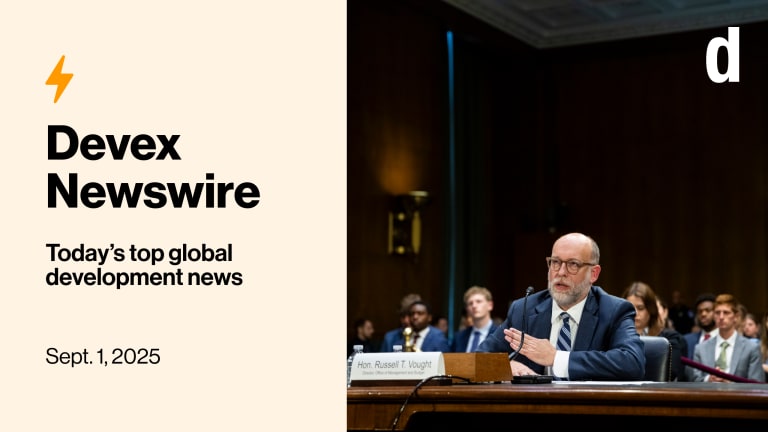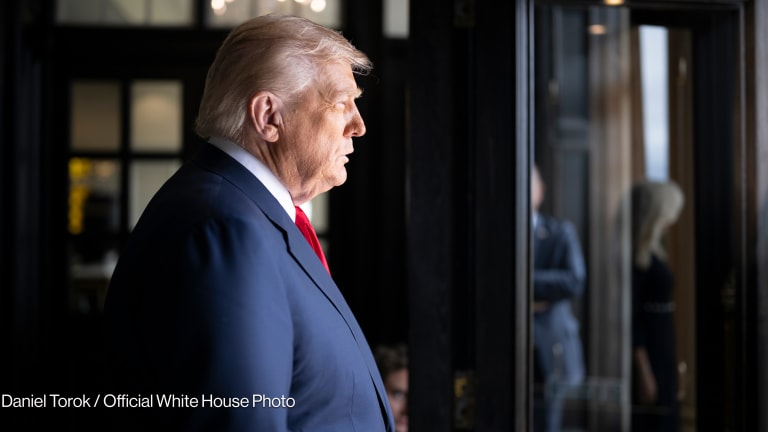'Rescission by another name.' Trump move sparks questions for implementers
The Trump administration's announcement of cuts to Central America foreign assistance is raising a lot of questions. An analysis of top implementers and funding by sectors shows which organizations will potentially be impacted.
WASHINGTON — President Donald Trump’s surprise announcement last week that the United States would cease all foreign assistance funds to the “Northern Triangle” countries of El Salvador, Guatemala, and Honduras has left NGOs, implementers, government agencies, and the U.S. Congress scrambling to determine how much funding and what programs could be impacted by a sudden evaporation of money. Trump, who has voiced frustrations with governments in Central America for not doing more to stop their populations from migrating, has also threatened to close the U.S. border with Mexico because people keep attempting to cross. In a region marked by gang violence, climate change impacts, and lack of economic opportunity, Northern Triangle countries with historically weak institutions have struggled to create stable societies and reduce drivers of migration. According to a U.S. Agency for International Development official, the agency is “carrying out the president’s direction to end foreign assistance programs for the Northern Triangle.” While Trump said last week he’s withholding $500 million, the official said that the president’s announcement impacts approximately $450 million of fiscal year 2018 allocations, and that the agency, along with the Department of State, have yet to determine the breadth of impact on fiscal year 2017 funds. An analysis of data on USAID’S Foreign Aid Explorer shows that USAID has currently obligated $556 million to the three countries in combined fiscal years 2017 and 2018, with Guatemala getting $225 million, Honduras $181 million, and El Salvador $150 million. All three countries get the largest share of the dollars for governance activities, followed by education. The agriculture sector receives large portions of USAID obligated funds in both Guatemala ($19 million) and Honduras ($23 million), while Guatemala and El Salvador receive $21 million and $22 million respectively for economic growth. Health funding is minimal in the three countries, while Guatemala gets $18 million in humanitarian aid. Which implementers might be impacted? An analysis of the top implementers in the three countries shows which organizations could be impacted by potential cuts. The top 10 non-U.S. government agencies with USAID programs in fiscal years 2017 and 2018 are a mix of NGOs, consulting firms, and for-profit implementers. Juárez & Associates is the top implementer for Guatemala ($11 million), Creative Associates for El Salvador ($15 million), and Education Development Center for Honduras ($13 million). USAID is the largest U.S. government agency giving assistance in Central America, with nearly $556 million obligated in fiscal years 2017 and 2018, while the State Department only obligated $18.4 million. The Department of Defense obligated $62.9 million and the Department of Agriculture $35.1 million. Members of Congress from both parties have spoken out against potential cuts to the Northern Triangle, many of them arguing that foreign assistance to the region across sectors is vital to U.S. national security and that the administration is obliged to spend money lawmakers have appropriated. Much like last year’s threatened budget rescissions targeting foreign assistance, it is unclear whether the body has any power to prevent the administration directive to stop funds. A congressional aide who was not authorized to speak on the record said that Trump’s announcement could amount to “a rescission by another name” if Congress rejects the administration’s proposed redirections for the funds lawmakers originally appropriated for the Northern Triangle. The White House will provide congressional notifications indicating where it would like to reprogram the assistance funds, but if Congress denies those requests, the money will not be spent. The aide said that language in recent funding bills mandates that the administration spend “up to” a certain amount of money in the Northern Triangle. This means the White House could argue it is not in violation of the Impoundment Act because some of the funds were spent, even if all of them were not. The USAID official said the agency is “engaging Congress” and said it, along with the State Department, “intends to consult with and notify Congress regarding the planned reprogramming of funds, consistent with applicable requirements.” Any reprogramming will be done consistent with congressional consultation and notification requirements, the official said. Plan could backfire NGOs say that cutting off funds will further hamper the ability of countries in the region to prevent migration, therefore only increasing the movement north that Trump seeks to prevent. The lack of concrete information about which funds and programs could be impacted is leaving implementers in the dark about if and how they should be planning to shut down programs and lay off staff. “Believe me, you don’t get funding for programs if you’re not demonstrating impact or success. It’s not like the U.S. government is throwing money right and left at each organization.” --— Celina de Sola, co-founder, Glasswing International Assistance for the Northern Triangle can be distributed through mission funding, central funding from USAID in Washington, or as part of global programs. Catholic Relief Services is one of the few organizations with programs in all three countries, and the organization is trying to figure out what the potential cuts could mean. “I don’t think any of us know. So right now, I know our folks at headquarters are reaching out to the administration and to contacts in Congress to talk with them,” said Kay Andrade of CRS in El Salvador. “One of the things we did start to do immediately was within each of the country programs look at what could potentially be impacted … We are spending time and trying to map that out.” Devex spoke with other NGOs and implementers, with many declining to speak on the record because they were still trying to assess what money could be cut and the impact the announced cuts could have on their operations. One implementer said its programs will continue to operate as scheduled until the organization receives notice not to, while another implementing partner said it has heard “informally” that programs will be cancelled. “If next week we got these instructions [formally], in my mind from an operational point of view, it would look like a tsunami went through and washed away quite a bit of everything that we’ve built ... together with USAID over the years,” that implementer said. “We’re also starting to run some budget exercises to see what we can save and what we can’t, and then offer different scenarios in the coming days for USAID to consider to try and keep the most important parts of the projects.” The announcement doesn’t just impact large NGOs and U.S.-based implementers. USAID gives direct funding to smaller, national NGOs that run programs in the Northern Triangle. El Salvador-based Glasswing International runs programs in all three countries, and co-founder and Vice President of Programming Celina de Sola said USAID funds make up about 35 percent of the organization’s budget. For every dollar it receives from the agency, it is required to fundraise another dollar for its programs. Glasswing has focused on measuring its impact to figure out how its youth programs can be scaled, and de Sola said that real development outcomes take time. “It’s a lot to ask for this to happen so quickly. This is an intergenerational challenge to address the root causes of violence and trauma,” de Sola said. “We have to really work with families and communities in a more integrated way. And that’s precisely what the U.S. government funds and has been funding, and believe me, you don’t get funding for programs if you’re not demonstrating impact or success. It’s not like the U.S. government is throwing money right and left at each organization.” De Sola said it can seem like civil society organizations are getting punished by the Trump administration’s frustration with the Salvadoran government — a strategy that doesn’t acknowledge the impact the different programs that address the root causes of migration are actually having. “We’ve seen how it works. We’ve had kids that enter our programs initially expressing an interest in potentially leaving [the country] because of their security circumstances or whatever, and months later they decide not to,” de Sola said. “It doesn’t seem like it gets better from the U.S. I think, but it is getting better here. It’s just we need to do more … it’s not overnight.”
WASHINGTON — President Donald Trump’s surprise announcement last week that the United States would cease all foreign assistance funds to the “Northern Triangle” countries of El Salvador, Guatemala, and Honduras has left NGOs, implementers, government agencies, and the U.S. Congress scrambling to determine how much funding and what programs could be impacted by a sudden evaporation of money.
Trump, who has voiced frustrations with governments in Central America for not doing more to stop their populations from migrating, has also threatened to close the U.S. border with Mexico because people keep attempting to cross. In a region marked by gang violence, climate change impacts, and lack of economic opportunity, Northern Triangle countries with historically weak institutions have struggled to create stable societies and reduce drivers of migration.
According to a U.S. Agency for International Development official, the agency is “carrying out the president’s direction to end foreign assistance programs for the Northern Triangle.” While Trump said last week he’s withholding $500 million, the official said that the president’s announcement impacts approximately $450 million of fiscal year 2018 allocations, and that the agency, along with the Department of State, have yet to determine the breadth of impact on fiscal year 2017 funds.
This story is forDevex Promembers
Unlock this story now with a 15-day free trial of Devex Pro.
With a Devex Pro subscription you'll get access to deeper analysis and exclusive insights from our reporters and analysts.
Start my free trialRequest a group subscription Printing articles to share with others is a breach of our terms and conditions and copyright policy. Please use the sharing options on the left side of the article. Devex Pro members may share up to 10 articles per month using the Pro share tool ( ).
Teresa Welsh is a Senior Reporter at Devex. She has reported from more than 10 countries and is currently based in Washington, D.C. Her coverage focuses on Latin America; U.S. foreign assistance policy; fragile states; food systems and nutrition; and refugees and migration. Prior to joining Devex, Teresa worked at McClatchy's Washington Bureau and covered foreign affairs for U.S. News and World Report. She was a reporter in Colombia, where she previously lived teaching English. Teresa earned bachelor of arts degrees in journalism and Latin American studies from the University of Wisconsin.








